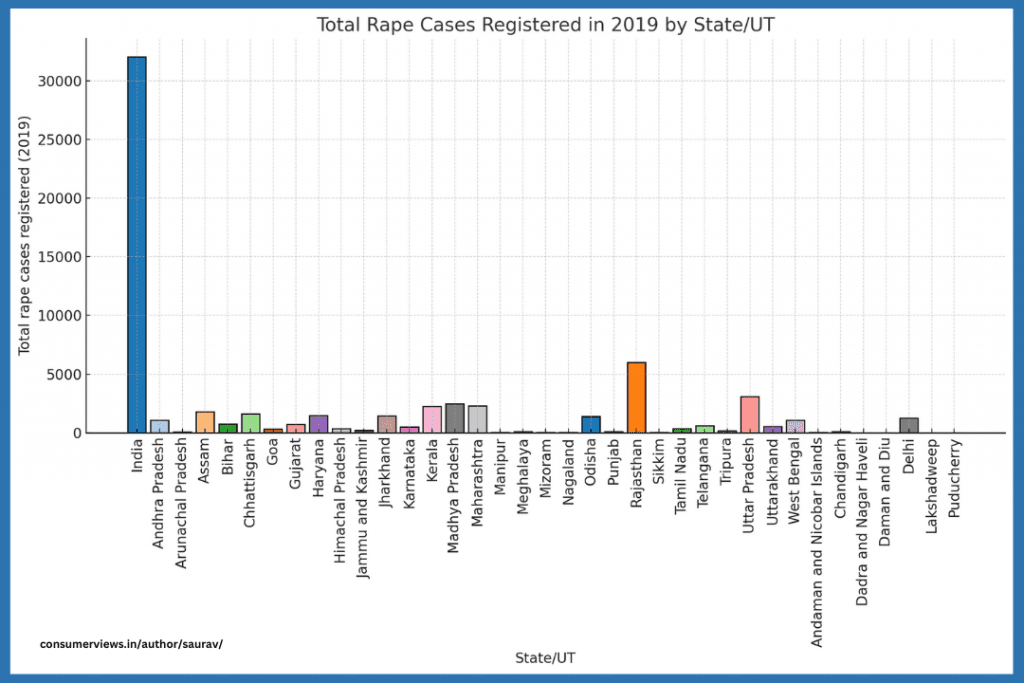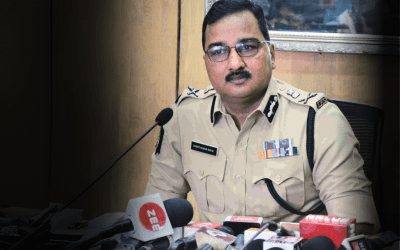INTRODUCTION
Rape comes fourth when ranking the most common crimes against women in India. The National Crime Records Bureau (NCRB) said in its annual report in 2021 that there were as many as 31,677 rape cases reported across India, or 86 cases daily. This comes up from 28,046 in 2020 as well as 32,033 in 2019 From the above tables we notice that the number of people that contracted diseases that were causalities of the Number of people that contracted diseases that were causalities of the COVID 19 increase every year. Out of the reported 31,677 rape cases, in 28,147 (88.6%) of the rape cases, the rapist was known to the victim.
But it was shocking to learn that, of the total victims, 10 percent were minors or below 18 years old; this is the legal age of consent.
Rape is said to be committed by someone who, except in the in the case hereinafter, has sexual intercourse with a woman in circumstances falling under any of the six following descriptions:Rape is said to be committed by someone who, except in the in the case hereinafter, has sexual intercourse with a woman in circumstances falling under any of the six following descriptions:
- Against her will.
- Without her consent.
- With her consent, when consent has been given by putting her or any person in whom she is interested in fear of death or of hurt,.
- With her consent, if the man knows that he is not her husband and that the consent is given by her in circumstances where she supposes him to be another man to whom she is or believes herself to be lawfully married,.
- Where she has given her consent thereto when, at the time of giving such consent, she was in a state of ‘unsoundness of mind’ or was ‘intoxicated’ or where consent has been given by her under influence of stupefying or unwholesome substance administered to her by him or by any other person with his knowledge and consent.
- Whether or not she has consented to the sexual conduct, if she is under the age of eighteen,.
- When she cannot verbally express herself as to her desire on the matter.
Explanation 1: For the intents and purposes of this section, labia majora are also encompassed by the term ‘vagina’.
Explanation 2: Consent can be defined as an affirmative express wish in a sexual context when the woman, with words, gestures or in any manner by word of mouth or otherwise, volunteer and clearly expresses her consent to involve herself in the practice of that particular sexual act.
However, given that a woman is not physically resisting as the act of penetration is being carried out, it is wrongful for the woman to be deemed to have consented to the sexual intercourse.
Exceptions 1: A medical procedure or interference shall not amount to rape
Exceptions 2: Any sexual intercourse or any sexual act with a man with his own wife does not amount to rape if the wife is not less than fifteen years of age.
NUMBER OF REGISTERED RAPE CASES IN INDIA UPTO THE YEAR END 2019

Some of the cases are as follows, which remain unresolved to date:Some of the cases are as follows, which remain unresolved to date:
Uttarakhand Rape Case (2021): A nurse of a private hospital was gang raped and murdered in Uttarakhand, & the accused one who raped the lady has attempted to cover up the crime in which he used a stone on her face and then dumped her dead body in an open field in a village of UP near the border to Uttarakhand as of August 16.
Ludhiana Rape Case (2022): A POCSO Act additional sessions judge, Amar Jeet Singh, while hearing a fast-track special court decision awarding gallows to a shopkeeper for the rape of a differently abled minor girl. In a rape case that was reported early this year, 20 years of rigorous imprisonment were awarded to the accused. Srinagar Rape Case (2020): There was the high-profile brutal rape and murder of a young woman in Srinagar, which, while disappointing for the performance of the organization, also ensured that the campaign highlighted sexual violence and justice in Jammu and Kashmir.
Jammu Rape Case (2022): One of the rape incidents that made news in Jammu in 2022 was a rape on a young girl; this generated protest and the scale of anger in the population.
Jammu Rape Case (2022): A rape that occurred in the year 2022 in Jammu with a young girl was the most highlighted and was categorized as the most heinous, which shocked everyone and led to protest. The high level of severity of the crime led to calls for enhanced law enforcement and increased justice for the sexual assault survivors in the region.
Madhya Pradesh Rape Case (2021): Owing to the publicity of the event in June of 2021, he was arrested and charged with rape and several other offenses by the Mahila Thana police in Katni district in November of 2021. He then sought relief in the high court He then sought relief in the high court. According to the HC directions, the woman as well as the man are literate persons and they have cohabited ‘willingly’ for more than ten years.
SIXTY YEARS OF LAW REGULATING RAPE IN INDIA
- Section 376 of the IPC: The first and foremost section that defines the punishment that is given for the offence of rape is Section 376 of the IPC. Under Secton 376(1), any person who commits the offence of rape shall be punished with a period of imprisonment, which shall not be less than 10 years but which may extend to imprisonment for life. Also of importance to note is that the kind of imprisonment afforded under this Section for the offence of rape is rigorous imprisonment. besides, it states that this shall not apply in the following cases set in sub-section 2 of Section 376.
- In Section 376(2), where the person falls under the below-mentioned category and commits rape, punishment for a period which shall not be less than ten years but which may extend to imprisonment for life is provided.
- Section 376 (3) criminalises the accused who has sexually assaulted the woman below the age of sixteen years, an amendment made by Criminal Law (Amendment) Act, 2018. This means that the accused person shall, on conviction, be sentenced to rigorous imprisonment for a period not less than twenty years and not exceeding imprisonment for life, which means the rest of the accused person’s life on the planet. In addition, the person shall also be required to pay the amount of the said fine as imposed on him, and the amount shall be reasonable to meet the medical bills and rehabilitation costs of the victim.
- Section 376A IPC: The aforesaid Section (amendment done in the year 2013, effective from 03.02.2013—Act 13 of 2013) contains punishment for a man who has committed the offence of rape defined in clause (f) of Section 376(1) and (2), where the act of the person causes the death of the victim or puts the victim in a persistent vegetative state. It provides that the accused person shall be punished with ‘rigorous imprisonment for not less than twenty years, which may be for life’.
- Section 376AB IPC: The aforesaid Section lays down the penalty that is to be imposed on the accused who has sexually assaulted a woman, and this crime is one of the most brutal one can commit when the woman is below 12 years of age. It also provides that the accused person shall be punished with ‘rigorous’ imprisonment for a period of not less than twenty years, which may extend up to imprisonment for life, that is the remaining period of the accused person’s natural life. In addition to the aforesaid provisions, the person shall also be liable to pay the fine amount as imposed on him for medical expenses and rehabilitation expenses of the victim and the same shall be just and reasonable.
- Section 376B IPC: While marital rape remains an uncovered offense in India to this day, the aforesaid provision prescribes punishment to a husband who, despite this, assails his wife or forces her to have sexual intimacy with him. But one needs to remember that this provision applies only where wife is residing separately (whether under a decree of separation or not, without the consent of the wife) and shall be liable for imprisonment for not less than two years but may extend up to seven years along with fine.
- Section 376C IPC: This Section prescribes penalty for any person who has sexual intercourse with a women while using force or any other form of authority over such woman. Of particular, if a person with authority entices a woman into having sexual intercourse with him, it is a punishable offence under this Section. Where a person of authority or a person who has fiduciary relationship or a public servant, or a superintendent or manager in jail, remand home or any other such institution, or any person in hospital management or staff of the hospital take unfair advantage of his position and forces the woman to have sexual intercourse with him, then he shall be sentenced to rigorous imprisonment for a term, which shall not be less than five years but may extend to ten years
- Section 376 D IPC: The aforesaid Section contains provisions for the punishment of the offence, which is gang rape. It provides that if such an offence of rape is committed against a woman by one or more persons acting together or acting with a common design, then under such circumstances each of those persons shall be deemed to have committed the act of rape. Besides, it provides that every such person shall be punished with rigorous imprisonment for a term which shall not be less than twenty years but which may be for life. In addition, the person shall also be taken to have committed the offense of paying the fine amount as imposed on him, which shall be just and reasonable to cater for the medical expenses and the expenses associated with the rehabilitation of the victim.
RG Kar Medical rape-murder case: Reveal of the missing Evidence through the CBI files
- Section 376 DA and Section 376 DB IPC: The accused, if convicted under Section 376 DA, faces punishment for the offence of gang rape with a woman who is below the age of sixteen years, while the accused, convicted under Section 376 DB, faces punishment for the offence of gang rape with a woman who is below the age of twelve years. Both sections prescribe punishment, which includes life imprisonment, which is of a rigorous nature, and a fine. Besides, it is necessary to note that a fine shall be reasonable and proportional to cover the medical need for appliances and rehabilitation for a victim.
- Section 376 E IPC: This Section prescribes penalty for the second or subsequent convictible of any offence that can be tried under Sections 376; 376A; 376AB; 376D; 376DA; or Section 376 DB, and the convict is again convicted under any of the above Sections. They are as follows: life imprisonment is defined as punishment (the rest of the days of a person’s life).
CONCLUSION
Finally, the rape cases in India raise questions over women’s security, the effectiveness of the legal system, and people’s mentalities. As for the high-profile cases, they are typically somewhat overcovered and result in public outrage; however, there are numerous unresolved cases that correspond to untold structural problems in law enforcement and the legal system.
That is why it is justifiable to implement extensive reforms with the aim of tackling such questions. To promote an end to gender-based violence, these reforms have to include provisions for augmenting support for the victims, extending criminal justice possibilities, and altering their views. It will never be possible to make the world better for all, with stages of logical progression that make it safe for all people, without extra efforts and collective, unrelenting work.
RG Kar Medical rape-murder case: Reveal of the missing Evidence through the CBI files








0 Comments